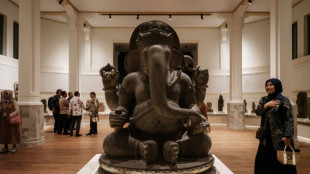
-
 Ski great Vonn finishes 14th on World Cup return
Ski great Vonn finishes 14th on World Cup return
-
Scholz visits site of deadly Christmas market attack

-
 Heavyweight foes Usyk, Fury set for titanic rematch
Heavyweight foes Usyk, Fury set for titanic rematch
-
Drone attack hits Russian city 1,000km from Ukraine frontier

-
 Former England winger Eastham dies aged 88
Former England winger Eastham dies aged 88
-
Yemen rebels strike Israel's Tel Aviv in pre-dawn missile attack

-
 Germany in shock after new deadly Christmas market attack
Germany in shock after new deadly Christmas market attack
-
Pakistan Taliban claim raid killing 16 soldiers

-
 Pakistan military courts convict 25 of pro-Khan unrest
Pakistan military courts convict 25 of pro-Khan unrest
-
16 wounded after Israel hit by missile fired from Yemen

-
 US Congress passes bill to avert shutdown
US Congress passes bill to avert shutdown
-
Sierra Leone student tackles toxic air pollution

-
 German leader to visit site of deadly Christmas market attack
German leader to visit site of deadly Christmas market attack
-
16 injured after Israel hit by Yemen-launched 'projectile'

-
 Google counters bid by US to force sale of Chrome
Google counters bid by US to force sale of Chrome
-
Russia says Kursk strike kills 5 after Moscow claims deadly Kyiv attack

-
 Cavaliers cruise past Bucks, Embiid shines in Sixers win
Cavaliers cruise past Bucks, Embiid shines in Sixers win
-
US President Biden authorizes $571 million in military aid to Taiwan

-
 Arahmaiani: the Indonesian artist with a thousand lives
Arahmaiani: the Indonesian artist with a thousand lives
-
Amazon says US strike caused 'no disruptions'

-
 Indonesians embrace return of plundered treasure from the Dutch
Indonesians embrace return of plundered treasure from the Dutch
-
Qualcomm scores key win in licensing dispute with Arm

-
 Scientists observe 'negative time' in quantum experiments
Scientists observe 'negative time' in quantum experiments
-
US approves first drug treatment for sleep apnea

-
 US drops bounty for Syria's new leader after Damascus meeting
US drops bounty for Syria's new leader after Damascus meeting
-
Saudi man arrested after deadly car attack on German Christmas market

-
 'Torn from my side': horror of German Christmas market attack
'Torn from my side': horror of German Christmas market attack
-
US House passes bill to avert shutdown, Senate vote to follow

-
 Bayern Munich rout Leipzig on sombre night in Germany
Bayern Munich rout Leipzig on sombre night in Germany
-
Tiger in family golf event but has 'long way' before PGA return

-
 Wall Street climbs as markets brace for possible govt shutdown
Wall Street climbs as markets brace for possible govt shutdown
-
Pogba wants to 'turn page' after brother sentenced in extortion case

-
 Court rules against El Salvador in controversial abortion case
Court rules against El Salvador in controversial abortion case
-
Reggaeton star Daddy Yankee, wife resolve business dispute

-
 French court hands down heavy sentences in teacher beheading trial
French court hands down heavy sentences in teacher beheading trial
-
Israel army says troops shot Syrian protester in leg

-
 Tien sets-up all-American NextGen semi-final duel
Tien sets-up all-American NextGen semi-final duel
-
Bulked-up Fury promises 'war' in Usyk rematch

-
 Major reshuffle as Trudeau faces party pressure, Trump taunts
Major reshuffle as Trudeau faces party pressure, Trump taunts
-
Reggaeton star Daddy Yankee in court, says wife embezzled $100 mn

-
 Injured Eze out of Palace's clash with Arsenal
Injured Eze out of Palace's clash with Arsenal
-
Norway's Deila named coach of MLS Atlanta United

-
 In Damascus meeting, US drops reward for arrest of Syria's new leader
In Damascus meeting, US drops reward for arrest of Syria's new leader
-
Inter-American Court rules Colombia drilling violated native rights

-
 Amazon expects no disruptions as US strike goes into 2nd day
Amazon expects no disruptions as US strike goes into 2nd day
-
Man Utd 'more in control' under Amorim says Iraola

-
 Emery insists Guardiola 'still the best' despite Man City slump
Emery insists Guardiola 'still the best' despite Man City slump
-
US confirms billions in chips funds to Samsung, Texas Instruments

-
 English Rugby Football Union chairman quits amid pay row
English Rugby Football Union chairman quits amid pay row
-
Wall Street rebounds despite US inflation ticking higher


The US economy is solid: Why are voters gloomy?
Cooling inflation, low unemployment, robust economic growth and... downbeat voters.
Despite indicators showing the US economy is moving in a healthy direction, many Americans remain pessimistic about business and job prospects -- a mood that poses a frustrating problem for Vice President Kamala Harris in her neck-and-neck race with Donald Trump for the White House.
Less than a month before November's presidential election, the US economy added around 100,000 more jobs than expected in September, saw wages grow further and inflation approach striking distance of policymakers' two percent target.
Yet, almost half the respondents of a New York Times/Siena College poll released Tuesday rated current economic conditions "poor."
Poll after poll has also found the economy -- particularly inflation -- to be a top voter concern by far.
While Harris has narrowed Trump's lead, polls have suggested voters favor the former president on economic issues.
Economists point to a cumulative rise in costs since the pandemic, still-high home prices and uneven job gains in explaining a seeming disconnect between data and voter sentiment.
"At the same time that they're aware that inflation has slowed, (consumers) remain frustrated by high prices," said Joanne Hsu of the University of Michigan.
For politicians, "the low-hanging fruit is trying to take aim at prices that people see on a day-to-day basis," economist Ryan Sweet of Oxford Economics said, referring to food and gas.
"This election cycle just highlights inflation is extremely unpopular," he added.
- Price shock -
"Over the last few years, consumers have gone through a period of very large price increases," Sweet told AFP.
"You'd have to go back to the 1970s and 1980s to see the last time that the US economy had inflation that high."
Inflation climbed to over 14 percent in 1980.
Consumers again saw price increases soar to a painful 9.1 percent in mid-2022.
"For many voters, that's the first time they experienced (such) inflation," Sweet said.
While the Consumer Price Index (CPI) fell to 2.5 percent in August, Sweet said "it's the price level that matters to the consumer" and not inflation numbers.
The CPI for food has risen 26 percent since February 2020 during the pandemic, he noted.
The cost of gas also increased, while that of new and used vehicles are around 20 percent above 2020 levels.
- Less savings -
Trump appears to be tapping into such sentiment.
"Inflation has devastated our economy," he told reporters last week.
Trump also linked last week's dockworkers strike to inflation, saying it badly hit workers.
On Sunday, he charged that "inflation will soar" if Harris took office and promised to "make America affordable again."
"Just seeing prices increase steadily over time weighs on the collective psyche, particularly for low-, mid-income households," said Sweet.
Voters' gloominess come despite the Congressional Budget Office finding in May that purchasing power grew across groups as incomes rose quicker than prices between 2019 and 2023.
It may be true that wages are rising faster than inflation in general, Hsu said, "but that's not necessarily true for an individual person."
And it's hard to shake off memories of the pandemic, said Nationwide chief economist Kathy Bostjancic.
"Those years where income fell short, household income, consumers relied more on credit cards or dipped more into their savings," added Bostjancic.
This means higher credit card bills and more delinquencies, especially among lower-income or younger people, adding to pressures like student loans, she added.
The pre-pandemic savings rate was over seven percent but currently stands at around five percent.
- Uneven hiring -
Overall hiring numbers also mask large variations across industries, said ZipRecruiter chief economist Julia Pollak.
Job growth has been concentrated in a few industries, with basically all jobs added recently going towards sectors that "only account for 48 percent of employment," she added.
The other half of US workers have seen "unusually slow growth in their industries," Pollak said, with hiring sluggish outside sectors like government, health care, and leisure and hospitality.
Although workers had 17 months of positive real wage growth, they experienced a longer period of negative growth previously.
"There are many workers who still feel like their wages need to catch up," she said.
R.Adler--BTB
